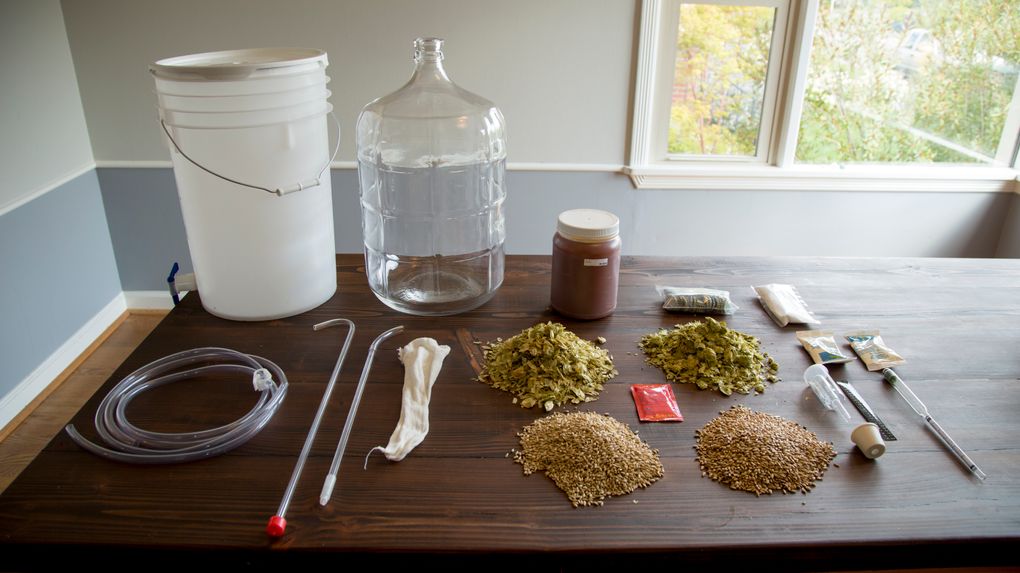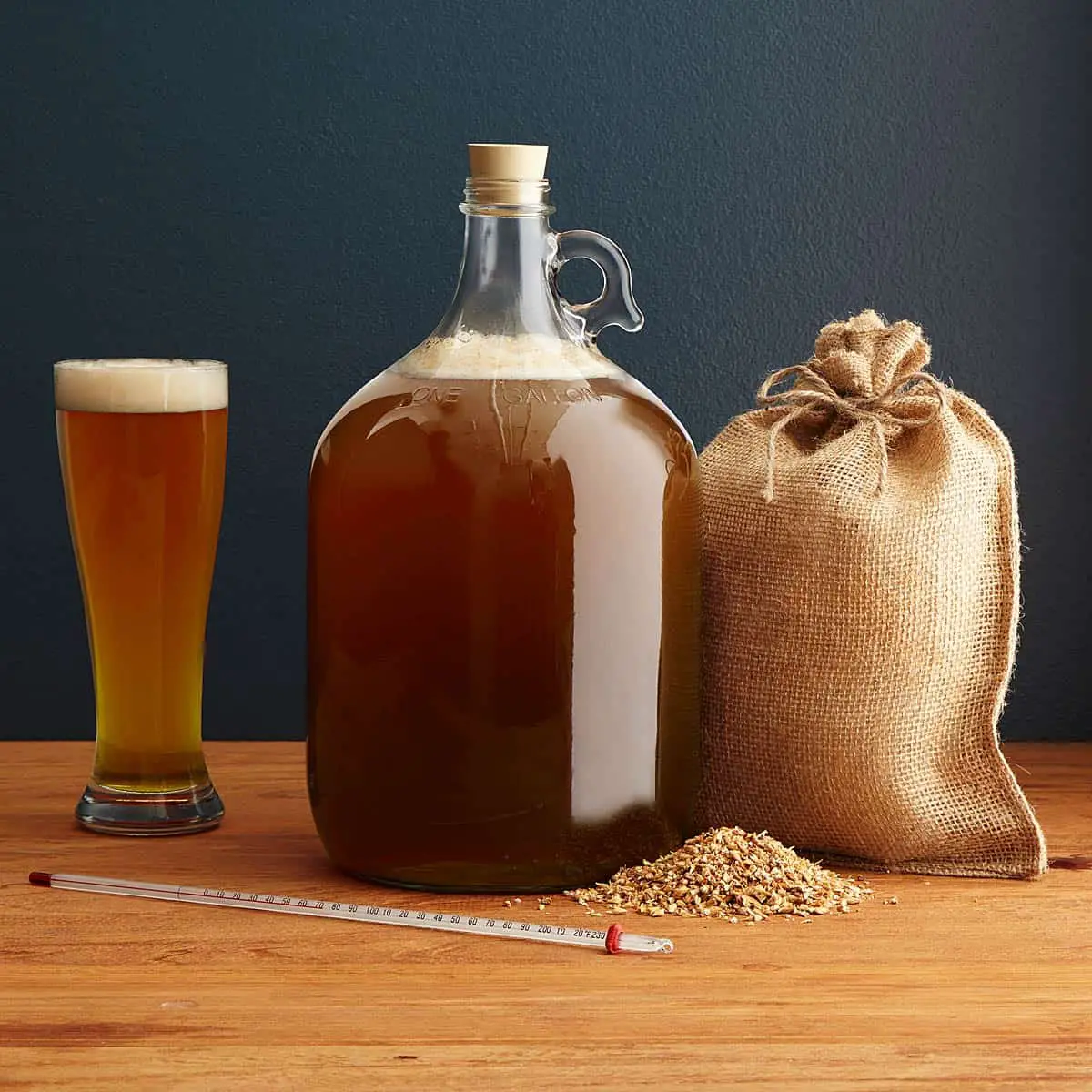Table of Contents
*This post may contain affiliate links. As an Amazon Associate we earn from qualifying purchases.
Brewing beer at home can seem near impossible if you’ve never done it before. It looks like a complicated process and one that takes too much work to undertake.
Thankfully, there are several beer kits on the market that make brewing beer at home much easier. They provide all of the equipment and ingredients you need to get started. A lot of seasoned homebrewers still use them over making beer from scratch.
But how do you choose the right kit? There are a few things you’ll want to consider. Ahead, we’ll cover everything you need to know about beer kits before making your choice.
Choosing a Beer Kit

There are a lot of options for beer kits out there. A simple search will net you thousands of results, each promising top-notch beer without much work.
It can be tough to sift through all of the beer kits to find the best one for you, so we compiled a short guide to things you should consider while making a selection. Whether you’re new to homebrewing or have been brewing for years and want to try something new, these tips should help you find the best beer kits on the market.
Fresh Ingredients

Fresh ingredients are the first thing you should look for when buying a beer kit. If you’re working with extracts and additives, you’ll be able to tell that your brew came from an unprofessional source.
These pre-hopped kits take a bit of work out of the equation, but the result is far from exceptional. Don’t get tricked into “simple” brewing kits. Brewing beer isn’t overly difficult, and skipping a few steps isn’t going to save you much time.
The net result will be a beer that you only drink for the novelty of the fact that you brewed it at home. It won’t taste better than anything you get from the store.
Clones

A lot of home brewing kits claim that they can recreate your favorite brew from your home. Some of these extract clones come close, but not all of them.
Take a look at user reviews before buying a kit. If most of the reviews are positive, you can probably trust that this is a quality clone but be careful. Some brands aren’t above paying for positive reviews.
If there’s a beer you love, it’s understandable to want to recreate it at home. If you’re brewing a beer for the first time, though, you should aim for a quality product over a recreation of a beer you might like. Don’t get swayed by these marketing tactics. Instead, focus on the important elements like fresh ingredients, shelf life, and flavor.
Simpler Isn’t Always Better
When beer kits tell you that you can make your own beer with little extra equipment or added ingredients, they probably aren’t the beer kits you’ll want to use. Just because the process seems simple, doesn’t mean it’s the best option.
Brewing beer isn’t overly difficult, especially with the help of beer kits. The process is easy to get the hang of once you do it a few times. If you choose the simplest route available, you doubtlessly be disappointed with the result.
Beer kits come in a variety of flavors, textures, and quality standards. Just because one looks like it takes a bit more work to master, doesn’t mean it’s the wrong choice.
Smaller Home Kits for Beginners

One of the more recent innovations in the homebrewing market has been small-batch brews for beginners. This is one of the most attractive options for those who are new to space since they don’t require much financial investment to get started.
These kits usually create one or two gallons of beer per batch. If you purchase the right product, it will use the same ingredients and materials that professionals use, but will cost less and create less in the end.
If you’re worried about how much use you’ll get out of a homebrewing kit, we recommend purchasing a smaller option. Still, there is an argument to be made for giving yourself room to expand, which we’ll cover a bit below.
Larger Home Kits for Advanced Brewers
If you’ve been brewing for years or looking to jump feet-first into the new hobby, larger homebrew kits will be the better selection for you. These kits will give you five or six gallons rather than one or two.
It doesn’t take much more effort or time to brew on a higher scale, but it does take a bit more space. If you’re working with a limited area or can’t find a place to store the equipment, you might still be better off choosing a smaller kit over the larger ones.
The most important element of any brewing kit – small or large – is the quality of ingredients and materials. Prioritize these elements first, then decide on which size you prefer.

Tips for Beginners
Now that you’ve selected a beer brewing kit, it’s time to get your hands dirty and start the beer brewing process. If you’re new, there’s still probably a lot you don’t know about the process. Beer kits give you direction on how to proceed, but it might not provide you with everything you need to know to be successful at brewing your beer.
Ahead, we’ll give you some tips that will make the long-term homebrew process a lot smoother and easier.
Give Yourself Room to Grow
If brewing beer is a new hobby, you might be inclined to cut corners and opt for the cheaper options when looking for tools. You may even choose the simples beer making kit so you don’t break the bank on something you might give up in a few months.
While this is a practical approach, it’s smart to give yourself room to grow if you think beer brewing is something that will hold your interest. You can end up spending more money in the long run if you opt for the smaller, cheaper equipment right off the bat.
The kettle, for instance, is a place where a lot of fresh homebrewers want to go small. They’d rather pay $30 for a kettle instead of $70 or $80 for one that’s a bit bigger. We recommend buying the bigger items right away, so you don’t have to spend more money when you decide to increase your quantity or brew a different kind of beer.
This piece of advice is most appropriate for those who are skipping starter kits altogether. Starter kits provide an easy way for people to get into brewing beer, but they aren’t the end-game. The tools they give you are helpful, but the ingredients often aren’t what you need to brew beer of the same quality you’d find in a professional brewery.
If you take home brewing seriously, you should buy equipment that gives you enough room to grow. After all, you can still split large batches from big kettles into smaller servings.

Starting Small, Then Expanding
Although giving yourself room to expand is a fantastic idea if your purchasing tools outside of your beer kit, you’re probably starting with smaller batches from the materials the basic kits provide.
Most beer kits will give you some smaller kettles for brewing that are perfect for beginners. Once you start exploring recipes you can make from scratch; the bigger options will be better. When you’re getting started, though, small batches are preferable.
Your first batch probably won’t come out the way you imagined it would, even if you follow advanced directions exactly as you were supposed to. Having massive quantities of sub-par beer isn’t ideal, and you’ll probably end up throwing it away when you try for a second time.
Once you get the hang of brewing beer, you’ll probably want to start brewing larger quantities to share with friends or store for later. This is where the larger equipment comes into play. A lot of beer kits are ingredients kits only, so buying a larger pot will give you room to explore different types of brews, both from a kit and from scratch.
You might not want to stop at beer, though. There are several other homebrew recipes for which you can use these old pots. You can always explore hard cider, wine, or mead with the small equipment.

The Importance of Cooling
The beer kits you purchase probably won’t have any sort of cooling tools in them. You’ll need to handle this process yourself, and don’t take it for granted. Cooling your beer is one of the essential steps in the brewing process for several reasons.
When your brew is still hot, you risk contamination from the airborne bacteria in the area. You need to cool it down as fast as you can to limit the risk that these bacteria contaminate your batch.
Keeping your brew hot for too long will also add more bitterness than you might want. If you’re searching for the smoothest homebrew you can create, cooling your brew is an essential step.

